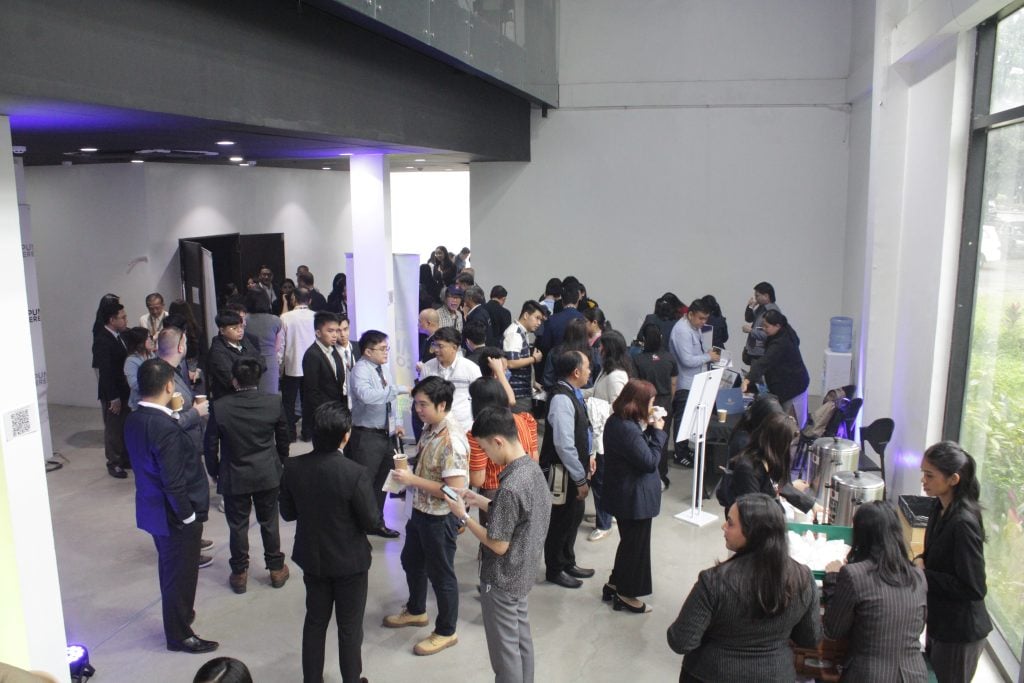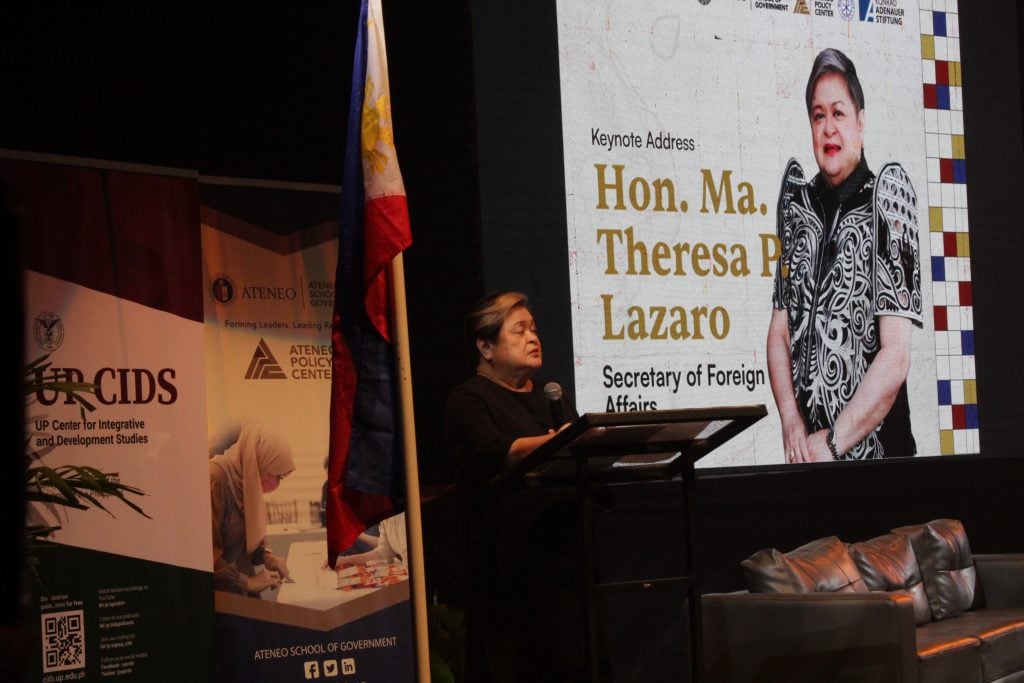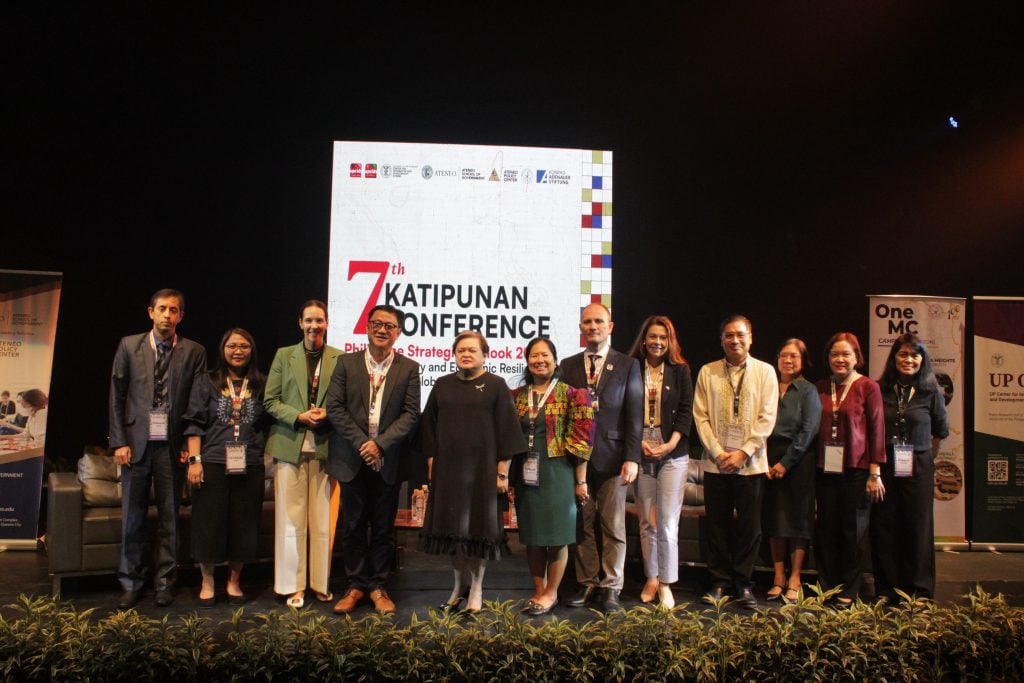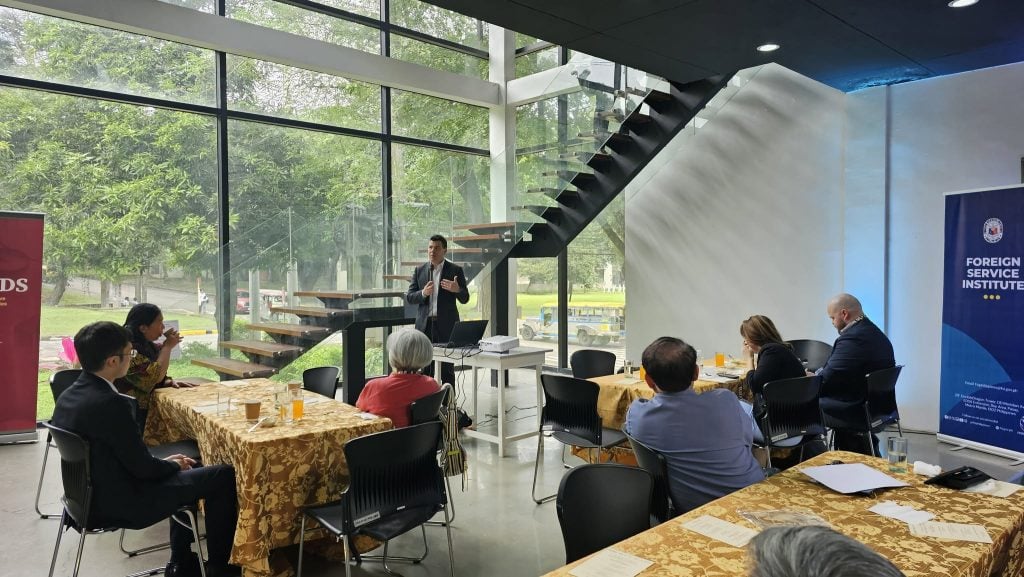Forging the Philippine Strategic Outlook: Key Takeaways from the 7th Katipunan Conference
The 7th Katipunan Conference, held on October 15–16, 2025, served as a vital annual platform for high-level, interdisciplinary dialogue on the Philippines’ strategic future. Jointly organized by the UP Center for Integrative and Development Studies (UP CIDS) Strategic Studies Program, the Ateneo School of Government and Policy Center, Miriam College, and in partnership with the Konrad Adenauer Stiftung – Philippines, the forum tackled the nation’s evolving landscape under the critical theme of National Security and Economic Resilience amidst a volatile global context.
Over 150 participants from various local government agencies, other UP units, state universities and international bodies attended the event onsite. Present were foreign embassy officials from the Japanese and Australian embassies; members of Konrad Adenauer Stiftung, staff and program officers from the Center for International Relations and Strategic Studies under the Department of Foreign Affairs – Foreign Service Institute, Office for Strategy and Policy under the Department of National Defense, Office of the Presidential Adviser on Peace, Reconciliation and Unity (OPAPRU); and faculty and students from the University of the Philippines Los Baños School of Environmental Science and Management, University of the Philippines Diliman Asian Center, University of Asia and the Pacific Political Economy Program, and West Visayas State University College of Arts and Sciences.

Keynote and Institutional Leaders
The conference was inaugurated with welcoming remarks from university leaders Atty. Angelo A. Jimenez (UP President), Fr. Roberto C. Yap, SJ (Ateneo de Manila University President) and Grace Flores-Favila (Miriam College OIC President).
The opening remarks were delivered by UP CIDS Executive Director Dr. Rosalie Arcala Hall as this year’s institutional host, and Ms. Daniela Braun, Head of the Philippines Office of Konrad Adenauer Stiftung. Former Ambassador Laura Quimbao-del Rosario also provided introductory remarks prior to the plenary session about Economic Resilience on the second day of the conference.

The highly anticipated Keynote Address was delivered by Hon. Ma. Theresa P. Lazaro, Secretary of the Department of Foreign Affairs, setting the tone for a strategic and policy-focused two days. Secretary Lazaro emphasized that international law serves as a “great equalizer” and remains the Philippines’ primary instrument for safeguarding national interests and promoting peace and security in the region—particularly in light of ongoing tensions in the West Philippine Sea. She further underscored that no single country can address today’s complex and emerging challenges alone, highlighting the essential role of sustained cooperation and multilateral engagement. In this regard, the Department of Foreign Affairs continues to expand and strengthen its network of partnerships to advance shared stability, resilience, and regional security.
The closing remarks were delivered by Dr. Jennifer S. Oreta, Dean of the Ateneo School of Government and Dr. Robert Frederick Hayden, Chair of the Global Affairs and Diplomacy Program at Miriam College.

Department of Foreign Affairs – Foreign Service Institute (DFA-FSI) Networking Luncheon
A special invite-only networking luncheon sponsored by DFA-FSI was held on the first day. This luncheon aimed to provide a venue for dialogue among guests of the conference and both emerging and established scholars. Invited were members of the foreign embassies, national government officials, and faculty from other UP units and state universities. It featured a luncheon address by Dr. Darren J. Lim, a Senior Lecturer at the School of Politics and International Relations from the Australian National University. He briefly discussed his research on geopolitics, drawing from the experience of the Australian government.

Expert Plenary Sessions: Framing the Outlook
The plenary sessions gathered top thinkers from government, military, and academia to integrate security and economic thought into policy.
- Sustaining Economic Resilience Amidst Global Disruptions: This discussion featured Carmina B. Acuña (Assistant Director General for Policy and Strategic Studies, National Security Council), alongside Te-Anne C. Robles, Ph.D. (UP Diliman), focusing on how national security policies intersect with economic stability.
- Economic Resilience from the Margins to Tariffs: Experts like Edith Yotoko-Villanueva (President and COO, Sugar Industry Foundation, Inc.) and Annette Balaoing-Pelkmans, Ph.D. (UP CIDS) analyzed resilience from local and structural perspectives, covering topics from ground-level development to the impact of geopolitical competition on trade. Also present is Anya Cruz (Executive Assistant in the Office of the Special Assistant to the President for Investment and Economic Affairs) who shared her insights on various technologies.
- Strategic Alignment in Flux: Reimagining Traditional Security in the Indo-Pacific: This critical session included Darren J. Lim, Ph.D. (Senior Lecturer, Australian National University), RAdm Rommel Jude Ong, AFP (Ret.), MDM (Senior Research Fellow, Ateneo Policy Center), and international defense fellows Jyun-Yi Lee, Ph.D. and VAdm Fumio Ota, JMSDF (Ret.), Ph.D., who dissected the Philippines’ strategic role, military modernization efforts, and alliances in the region.
Parallel Sessions: Deep Dives into National Strategy
Eight parallel sessions showcased emerging research and specialized policy insights, grouped into three major tracks: Traditional Security, Non-Traditional Threats, and Economic Resilience.
Traditional Security Track
- The Philippines’ Strategic Role in the Indo-Pacific: Scholars like Jhon Mark M. Rosales and Jerome M. Inoc presented analyses on the country’s pivotal position in the regional order and its responses to geopolitical dynamics, particularly concerning China’s ambitions. Jomari Jesus Tan also presented about spiderweb diplomacy.
- Philippine Military Modernization Efforts: This session featured research by Vincent Kyle D. Parada and Justin Baquisal on the naval build-up and the conceptual and implementation issues surrounding the ‘Archipelagic Defense’ strategy. Santiago L. Castillo meanwhile presented defense issues in the Philippines within the US Regional Sustainment.
- Alliances & Partnerships: Presenters, including Christian F. Pimentel, Leenil A. Ocampo, and Matteo Piasentini, provided in-depth analysis of the country’s deepening defense ties, focusing particularly on local counterterrorism through local reintegration program, the Defense and Security Partnership with Japan and the strategic implications of the emerging JAPHUS trilateral framework.
Non-Traditional Threats Track
- Environmental and Maritime Security: Focused on complex issues in the West Philippine Sea, Wee Yi Ren Mark discussed the operational tactics of China’s Maritime Militia. Researchers John Nicolas B. Mejia examined the nexus between environment and health, Agnes Chung Balota explored the strategic value of mangroves as a ‘Blue Carbon’ asset while Irvin Hibaler looked at the convergence of naval power and environmental protection.
- Climate Change and Disaster Resilience: Sessions addressed the increasing risks from climate change, with Mary Dei P. Advincula and Heinz Herald S. Capati presenting on specialized risk assessments for cultural heritage sites and the critical issue of housing experiences for flood-displaced communities. Ken Emmanuel Merluza meanwhile shared risk assessment and adaptation measures for heritage treasures such as churches.
- Information and Technology: The panel tackled technological challenges, with scholars like Marvin H. Bernardo and Ruth Anna Julia S. Castro presenting on cybersecurity, the political economy of using film as foreign policy, and the impact of regional weather on space-based intelligence collection platforms. Mark Pere Madrona shared the historical context of cyber and national security.
Economic Resilience Track
- Geopolitics and Economic Strategy: This session connected global events to domestic policy, with papers from Jenan S. Naz and One Miguel B. Policarpio analyzing the U.S.-China Trade War from a Marxist-Constructivist viewpoint and exposing the security risks posed by POGO networks and influence operations. Andre Rafael N. Gonzales also delved into the Philippine relationship with the US and China.
- Domestic Economic Development: The final session, featuring James Victor M. Esguerra, Lorenzo Thomas M. Lazaro, and Bernard Errol M. Advincula, explored pathways to internal strength, including the role of Development Financial Institutions (DFIs), the geoeconomics of Artificial Intelligence and Semiconductors, and integrating the vital Nickel Mining Sector with the Philippine defense industry.
Partnership and Collaboration
The conference was generously supported by our partner institutions. In addition to the DFA-FSI sponsored luncheon on the first day of the conference, the university partners also provided support on the second day. Miriam College sponsored breakfast meals while the Ateneo School of Government provided lunch. The conference also had 18 volunteers from the Miriam College Global Diplomacy program providing logistical support alongside the organizers and UP CIDS staff.
Launch of the 6th Katipunan Conference Monograph
On the last day of the conference, the publication of the 6th Katipunan Conference Monograph was announced. This publication features papers from the 2024 iteration of the Katipunan Conference. Entitled “Philippine Strategic Outlook 2024 Onwards: National Security and Economic Resilience”, the publication compiles papers covering key themes such as geopolitical strategy, economic resilience, internal security, maritime defense, and cybersecurity. The electronic version of this monograph is ready and available on the UP CIDS website.
A monograph will also be produced from this year’s conference featuring select papers of presenters from the parallel sessions. In partnership with Konrad Adenauer Stiftung, the 7th Katipunan Conference Monograph is set to be released by November 2025.